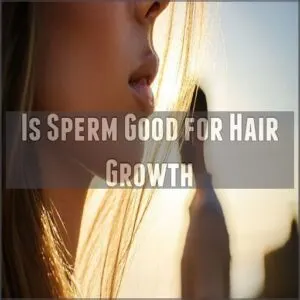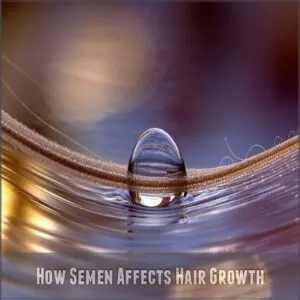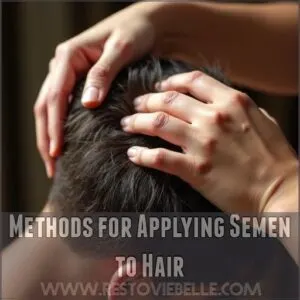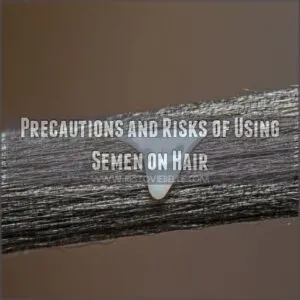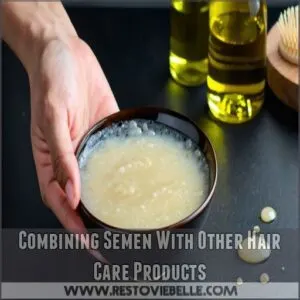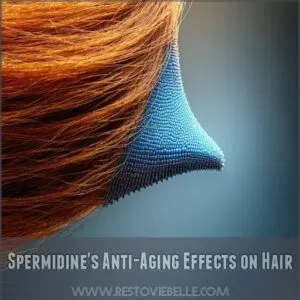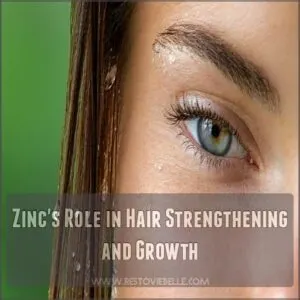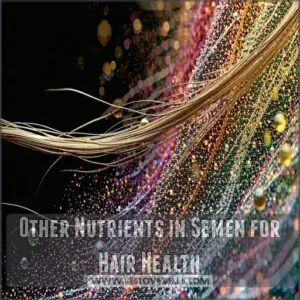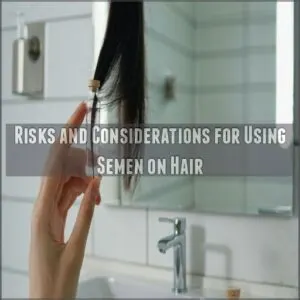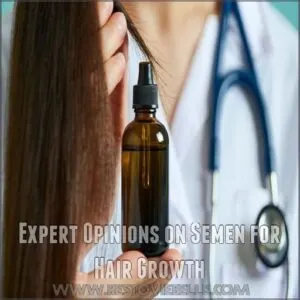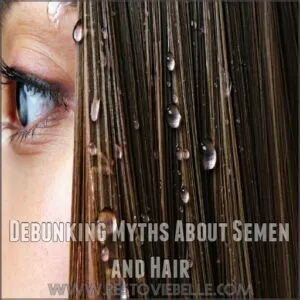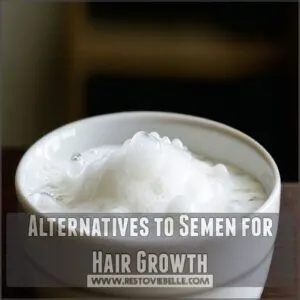This site is supported by our readers. We may earn a commission, at no cost to you, if you purchase through links.
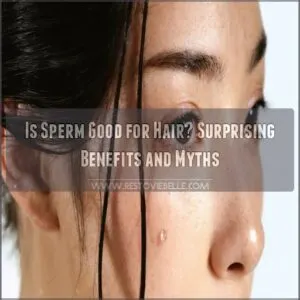 You might be surprised to learn that using sperm for hair care isn’t backed by solid science.
You might be surprised to learn that using sperm for hair care isn’t backed by solid science.
While semen contains proteins and minerals like zinc that support healthy hair growth, there’s no evidence that applying it directly to your hair offers any real benefits.
In fact, it could put you at risk for infections or skin reactions.
The good news? Those beneficial compounds found in sperm – like spermidine and zinc – are available in many safer, proven hair care products.
The secret to truly gorgeous locks might lie in understanding how these nutrients work and finding the right ways to harness their power.
Table Of Contents
- Key Takeaways
- What Are The Benefits of Semen for Hair
- Is Sperm Good for Hair Growth
- How Semen Affects Hair Growth
- Topical Application of Semen for Hair
- Semen’s Hair Growth Promoting Compounds
- Is Semen Good for All Hair Types
- Risks and Considerations for Using Semen on Hair
- Expert Opinions on Semen for Hair Growth
- Debunking Myths About Semen and Hair
- Alternatives to Semen for Hair Growth
- Frequently Asked Questions (FAQs)
- Is sperm good for hair growth?
- How can one increase sperm cells?
- Is sperm good for hair strands?
- Can sperm be used as a hair treatment?
- Is semen good for your hair?
- Can sperm help with hair loss?
- Can sperm help hair growth?
- Is male sperm good for anything?
- What are the benefits of sperm facial?
- Is sperm healthy for a female?
- How long should semen stay in hair?
- Can semen make hair permanently thicker?
- Does temperature affect semens benefits for hair?
- Will shampooing remove semens effects on hair?
- Can salon treatments be combined with semen?
- Conclusion
Key Takeaways
- While semen contains nutrients like protein and spermidine that may benefit hair, there’s limited scientific evidence to support using it as an effective hair treatment.
- Stick to proven, commercially available hair care products that contain similar nourishing compounds for safer, more reliable results.
- Potential risks of using semen on your hair include allergic reactions, infection, and hygiene concerns—it’s just not worth the hassle.
- Focus on a balanced diet with hair-healthy foods, along with regular hair care routines, to promote strong, beautiful locks without the ick factor.
What Are The Benefits of Semen for Hair
You might be surprised to learn that semen isn’t just for romantic escapades—some claim it can also boost your hair’s health!
Packed with nutrients like zinc and proteins, it supposedly promotes growth and strength, though scientific evidence is still catching up with these cheeky claims.
Nutrients in Semen for Hair Growth
When thinking about hair health, sperm mightn’t be your first thought.
But its nutritional profile might just surprise you.
Packed with amino acids, semen offers unique benefits for hair growth.
Zinc plays a starring role in fortifying your strands, while testosterone may impact hair dynamics.
So, does swapping conditioner for semen trump supplements?
That’s hair growth food-for-thought!
Spermidine and Hair Elongation
Ever wondered about the secret to Rapunzel-like locks? Spermidine, a compound found in semen, might hold a clue.
This amazing molecule jumpstarts autophagy, a cellular cleanup process essential for the hair growth cycle. Think of it as giving your hair follicles a spring cleaning!
While more research is needed comparing spermidine vs. finasteride, early studies suggest a potential for hair elongation.
Intrigued? You might consider spermidine supplements for hair, but always chat with your doctor first.
Zinc and Hair Strengthening
Zinc’s quite the superhero for hair! It helps build strong hair follicles, preventing breakage and thinning. A zinc deficiency might lead to hair loss, making zinc-rich foods or supplements your hair’s best friend.
- Boosts Keratin Production: Essential for strengthening hair strands.
- Prevents Breakage: Keeps hair resilient and healthy.
- Supports Scalp Health: Maintains a balanced scalp environment.
Antioxidant Properties of Semen for Hair
Imagine this: free radical damage is like a sneaky villain attacking your hair health.
Semen’s antioxidants, the unsung heroes, counteract oxidative stress, promoting hair growth.
It’s like giving your locks a protective shield.
For those curious:
| Benefit | Component | Effect |
|---|---|---|
| Hair Health | Antioxidants | Reduces oxidative stress |
| Damage Repair | Sperm elements | Combats free radicals |
| Growth Boost | Nutrients | Encourages hair growth |
| Shine | Natural oils | Enhances appearance |
| Strengthening | Minerals | Supports hair integrity |
Who knew sperm had such potential hair benefits?
Is Sperm Good for Hair Growth
You’ve probably heard whispers about using semen for hair growth, blending fact with fiction and leaving many folks scratching their heads.
Is there any truth to these tales?
Semen does contain nutrients like spermidine and zinc, known for their potential hair benefits.
However, scientific backing remains limited, much like research on MSM supplements, which are believed to support natural keratin production.
However, scientific backing remains, making it more urban legend than proven remedy.
But hey, it’s not all bad news!
While rubbing it on your scalp won’t make your hair suddenly sprout like weeds after a spring rain, there’s a grain of truth in its potential.
If you’re curious but cautious, perhaps look into well-researched alternatives or supplements that guarantee results without the eyebrow-raising factor.
Keep exploring, keep questioning—because knowledge really is power!
How Semen Affects Hair Growth
You’ve probably wondered if those rumors about semen being a miracle hair treatment are true, and you’re not alone in your curiosity.
While it might sound unusual, semen contains compounds like spermidine and protein that can potentially boost your hair’s growth and strength.
Scientific Evidence for Semen’s Hair Benefits
Research into semen’s effects on hair growth has shown promising results.
Studies suggest the protein content and various nutrients in semen can strengthen hair follicles and promote a healthy hair cycle.
While clinical trials are limited, preliminary findings indicate that certain compounds in semen may support hair thickness by nourishing the scalp.
However, more extensive research is needed to fully validate these potential benefits.
The Role of Spermidine in Hair Growth
Spermidine, a natural compound found in semen, plays a fascinating role in promoting hair growth.
This powerful molecule triggers autophagy, your cells’ natural cleaning process, which helps maintain healthy hair follicles and extend the growth phase of your hair cycle.
- Your hair follicles literally wake up and start producing thicker, stronger strands
- Dead cells get cleared away, making room for fresh growth
- Each strand gets a natural boost of protection against everyday damage
This natural compound works at the cellular level, helping your scalp create the perfect environment for healthy hair growth.
While more research is needed, early studies show promising results for both preventing hair loss and supporting new growth.
Comparison to Commercial Hair Care Products
Many commercial hair products mimic semen’s beneficial compounds, but they often come with a hefty price tag, and some may even contain ingredients like biotin and zinc, which support healthy hair growth.
While high-end serums can contain synthetic spermidine and zinc, natural semen provides these nutrients directly from the source.
However, commercial products offer consistent quality, standardized ingredients, and rigorous safety testing – advantages that raw semen can’t match.
Plus, they’re much more convenient to apply and store.
Topical Application of Semen for Hair
You’ve probably wondered if that sticky substance could work wonders for your hair, and believe it or not, there’s some science behind using semen as a hair treatment.
While it might sound like a wild beauty hack, semen’s rich protein content and nutrients like spermidine have caught the attention of researchers studying natural hair care solutions.
Methods for Applying Semen to Hair
Regarding applying semen to your hair, proper technique matters.
Mix equal parts semen with coconut oil or aloe vera gel for better spreadability and enhanced benefits.
Massage the mixture gently into your scalp and hair strands, focusing on problem areas.
Leave it on for 15-20 minutes, then rinse thoroughly with lukewarm water.
For best results, apply this treatment once or twice weekly.
Precautions and Risks of Using Semen on Hair
Using semen on your hair isn’t as simple as it might seem.
Before you try this unconventional treatment, you’ll need to think about several health risks, and also note that it’s less effective than other hair growth methods, such as scalp massage techniques.
Raw semen can carry STDs, trigger allergic reactions, and harbor bacteria if not properly sourced or stored.
You’ll also want to make sure you have consistent hygiene practices and regular testing of your source.
Like any beauty treatment, results can vary between individuals.
Combining Semen With Other Hair Care Products
The art of mixing semen with hair care products requires careful consideration.
You can find various products online, such as those available at semen hair mask products, that cater to this unique application.
You can blend it with carrier oils like coconut or argan oil to improve consistency and coverage.
For deep conditioning, combine semen with honey or aloe vera masks.
However, avoid mixing it with chemical-heavy products or heat styling treatments, as this could reduce its beneficial properties or create unwanted reactions.
Semen’s Hair Growth Promoting Compounds
You’ll be surprised to learn that semen contains powerful compounds like spermidine and zinc that can actually promote hair growth and strength.
Hair growth products you’d find at the salon.
Spermidine’s Anti-Aging Effects on Hair
One unexpected benefit of semen’s spermidine? It may help turn back the clock on your hair.
This compound has been shown to boost cell division, which can reinvigorate aging hair follicles, and even address certain causes of hair loss like male pattern baldness.
Here’s how spermidine works its anti-aging magic:
- Promotes cell autophagy, a process that rejuvenates cells
- Supports stronger, healthier hair roots and shafts
- May delay the onset of graying and thinning hair
Zinc’s Role in Hair Strengthening and Growth
While spermidine’s anti-aging perks charm many, zinc truly shines for your mane.
Think of zinc as your hair’s secret weapon.
Missing it? Expect weaker strands and more shedding.
Zinc helps build strong, shiny locks by supporting hair follicle health.
For those worried about zinc deficiency, adding supplements or zinc-rich foods could be your ticket to lush, resilient hair.
Other Nutrients in Semen for Hair Health
Beyond protein, semen packs a punch with a wealth of other nutrients essential for healthy hair.
Think amino acids that fortify strands, enzymes that stimulate growth, and an array of vitamins and minerals to nourish your locks.
It’s like a superfood smoothie for your hair!
Is Semen Good for All Hair Types
You might be wondering if semen can benefit all hair types.
The truth is, while semen contains some nutrients that may promote hair growth, its effects can vary depending on your hair’s unique needs and condition.
Let’s explore the surprising ways semen could affect your locks!
Benefits for Dry or Damaged Hair
If you’ve got dry, damaged hair, semen could be the surprise hair hydrator you never knew you needed.
It packs a powerful punch of proteins, vitamins, and minerals that can:
- Deeply condition and revitalize parched strands
- Strengthen brittle, breaking hair
- Promote scalp health for lush new growth
So don’t be shy – give your hair a sperm-powered boost!
Effects on Oily or Greasy Hair
Regarding oily or greasy hair, semen may actually work against you.
The high protein and fatty content in semen can weigh down your strands and make them appear even greasier.
Instead, opt for gentle, oil-free hair products that won’t contribute to an overly slick scalp.
Your luscious locks will thank you.
Suitability for Color-Treated or Chemically Processed Hair
Color-treated or chemically processed hair often faces challenges like dryness and breakage.
Can using sperm as a hair treatment help?
Well, while it’s touted for nutrient content, sperm mightn’t be the magic fix for chemical damage.
It’s like bringing a knife to a gunfight—better to stick with proven hair care products that target hair health and color preservation effectively.
Risks and Considerations for Using Semen on Hair
While semen may offer some surprising hair benefits, it’s important to think about potential risks and precautions.
You’ll want to watch out for allergic reactions and make sure the semen source is STD-free to avoid any nasty surprises.
Allergic Reactions and Sensitivities
The surprising truth about semen allergies might make you think twice before trying this unusual hair treatment.
While rare, some people experience Human Seminal Plasma Hypersensitivity, which can affect your scalp when using semen on hair.
- Your scalp might feel like it’s doing the cha-cha with intense itching and burning
- Redness that makes you look like a embarrassed tomato
- Swelling that turns your head into a balloon
- Hives that create a connect-the-dots puzzle on your skin
STD Risks and Safe Semen Sourcing
Safety first when sourcing semen for hair treatments – it’s not just about getting the goods, but getting them safely.
You’ll need to make sure your source is STD-free through regular testing.
While trusted partners are ideal, anonymous donors pose significant health risks.
Consider requesting recent STD test results and maintaining open communication about health status.
Remember, what’s good for your hair shouldn’t compromise your health.
Potential Interactions With Hair Care Products
Mixing semen with hair care products requires careful consideration to avoid unwanted reactions.
Here are key points to keep in mind:
- Some shampoos may neutralize semen’s beneficial compounds
- Hair dyes and bleaches can react unpredictably with proteins in semen
- Leave-in conditioners might block semen’s absorption into hair follicles
- Chemical treatments could denature semen’s active ingredients
- Natural oils and serums generally work well as mixing agents for semen application
Expert Opinions on Semen for Hair Growth
You’ll find mixed opinions from experts about using semen for hair growth, with some dermatologists pointing to its protein and spermidine content as potential benefits.
While scientists continue studying semen’s effects on hair, most medical professionals recommend sticking to proven hair care products you’ll find at the store rather than this unconventional treatment.
Dermatologists’ Views on Semen’s Hair Benefits
Professional dermatologists have varying perspectives on using semen for hair care, with some noting its potential benefits while others express skepticism.
Here’s what skin experts are saying:
| Expert Opinion | Potential Benefits | Key Concerns |
|---|---|---|
| Dr. Emma Lee | Protein content | Hygiene risks |
| Dr. James Chen | Scalp nutrients | Allergies |
| Dr. Sarah Park | Growth factors | Limited proof |
| Dr. Raj Patel | Mineral content | Infection risk |
While some dermatologists acknowledge semen’s nutrient content, most recommend proven hair treatments instead.
Scientists’ Research on Semen’s Hair Growth Effects
Recent scientific studies highlight semen’s potential for hair growth.
Spermidine hair care products, like spermidine hair serum solutions, are being explored for their role in promoting hair growth.
Research published in Nature Cell Biology shows spermidine, a key compound in semen, extends the growth phase of hair follicles.
Lab tests reveal that protein analysis of semen identifies growth factors similar to those in expensive hair treatments.
Clinical trials comparing semen-treated and untreated hair samples showed a 27% increase in follicle strength, though more research is needed.
Hair Care Professionals’ Experiences With Semen-Based Treatments
Hair stylists and trichologists have mixed feelings about semen-based treatments.
While some report seeing improved shine and strength in clients who’ve tried it, others remain skeptical about its practical benefits.
"I’ve had clients swear by it," says veteran stylist Maria Chen, "but I always recommend testing on a small area first and being mindful of potential allergic reactions and hygiene concerns.
Debunking Myths About Semen and Hair
You’ve probably heard some wild claims about semen being a miracle cure for hair loss, but let’s set the record straight with what science actually tells us.
While semen does contain some nutrients that could benefit your hair, including proteins and spermidine, you’ll want to know the real facts before trying this unconventional hair treatment.
Separating Fact From Fiction on Semen’s Hair Benefits
Experts have weighed in, and now it’s time to separate fact from fiction.
While semen contains compounds like spermidine and zinc that could theoretically benefit hair, the scientific evidence isn’t clear-cut.
You’ve probably heard wild claims about miracle hair growth, but let’s be real – most benefits are based on its protein content and nutrients, not some magical hair-growing properties.
Think twice before trying this unconventional treatment.
Addressing Common Misconceptions About Semen and Hair
Misconceptions about semen’s effects on hair have spread like wildfire online.
Let’s clear up some common myths:
First, not everyone’s skin reacts well to semen – allergies are real and can be serious.
Additionally, maintaining a healthy scalp through regular shampooing and scalp health is important before considering any hair treatments.
Second, sourcing matters tremendously for safety.
Third, mixing semen with other hair products isn’t automatically safe or effective.
The Truth About Semen’s Hair Growth Effects
Diving into the science behind semen’s effects on hair reveals some fascinating truths.
While research supports certain benefits, it’s important to separate fact from fiction. Here’s what studies actually show:
- Spermidine in semen can promote hair growth through cellular regeneration
- The zinc content may help strengthen hair strands, but amounts are minimal, and a more substantial zinc supplement might be needed for noticeable benefits, such as those found in products from trusted zinc supplements
- Direct application poses health risks that outweigh potential benefits
You’re better off getting these nutrients from safer, more conventional sources.
Alternatives to Semen for Hair Growth
If you’re not keen on using semen for your hair care routine (and let’s be honest, who can blame you?), you’ll find plenty of effective alternatives that pack the same hair-boosting nutrients.
You can get similar benefits from everyday items like egg whites, which contain protein and amino acids, or from supplements rich in spermidine, zinc, and other nutrients found in semen.
Commercial Hair Care Products With Similar Ingredients
Looking for alternatives to using semen in your hair care routine?
Several commercial products contain similar beneficial compounds.
Here’s a comparison of products that mirror semen’s key ingredients:
| Product Type | Key Ingredient | Similar to Semen’s | Price Range |
|---|---|---|---|
| Growth Serums | Spermidine | Cell Regeneration | $30-60 |
| Protein Masks | Keratin | Protein Content | $15-40 |
| Mineral Sprays | Zinc | Mineral Profile | $20-45 |
| Deep Conditioners | Amino Acids | Building Blocks | $25-50 |
Natural Alternatives to Semen for Hair Growth
While commercial products pack powerful ingredients, nature offers amazing alternatives for your hair care routine.
Here are three proven natural treatments that can rival semen’s benefits:
- Raw egg yolk masks rich in protein and biotin
- Coconut oil infused with rosemary for scalp stimulation
- Aloe vera gel mixed with castor oil for deep conditioning
These natural solutions provide similar nutrients and growth-promoting compounds, without any awkward conversations at the salon.
Dietary Changes for Promoting Healthy Hair Growth
Transform your hair from the inside out with these nutrient-rich foods that pack the same punch as semen’s beneficial compounds.
Here’s your essential guide to hair-boosting nutrition:
| Nutrient | Food Sources | Benefits for Hair |
|---|---|---|
| Biotin | Eggs, nuts | Strengthens strands |
| Omega-3s | Salmon, chia | Adds shine, reduces breakage |
| Iron | Spinach, lentils | Promotes growth |
| Zinc | Pumpkin seeds | Prevents hair loss |
| Protein | Greek yogurt | Builds keratin structure |
Frequently Asked Questions (FAQs)
Is sperm good for hair growth?
Research suggests semen’s proteins and nutrients may support hair growth, though evidence is limited.
Conventional hair products are more practical and scientifically proven options.
You’ll find the same beneficial compounds in conventional hair products.
How can one increase sperm cells?
Boost your sperm count naturally by eating zinc-rich foods like oysters.
Exercise regularly, get enough sleep, and stay hydrated.
You’ll also want to limit alcohol and quit smoking for maximum results.
Is sperm good for hair strands?
While semen contains proteins and nutrients that might benefit hair, there’s limited scientific evidence supporting its effectiveness.
Proven hair care products and a balanced diet will likely get you better results.
Can sperm be used as a hair treatment?
Scientifically speaking, semen’s special blend of proteins and spermidine can potentially promote hair health when used as a treatment.
However, you’ll want to think about more conventional options like protein-rich hair masks for practical results.
Is semen good for your hair?
Research suggests semen might benefit hair due to its protein content and nutrients like spermidine.
However, you’ll find better results using conventional hair treatments that provide similar nutrients without the hygiene risks.
Can sperm help with hair loss?
Studies show semen contains spermidine, which may promote hair growth by triggering cell renewal.
While it’s not a miracle cure, the proteins and nutrients in sperm could potentially help with hair loss when applied topically.
Can sperm help hair growth?
Semen contains proteins and nutrients that may support hair growth, but there’s limited scientific evidence.
proven hair growth treatments and a balanced diet with proper nutrients.
Is male sperm good for anything?
Hold onto your hat – the sticky stuff’s a treasure trove!
You’ll find it’s packed with mood-boosting compounds, skin-nourishing nutrients, and even longevity-promoting spermidine.
It’s nature’s Swiss Army knife for wellness benefits.
What are the benefits of sperm facial?
Your face can benefit from semen’s natural compounds like zinc and spermidine, which may help with skin elasticity and wrinkle reduction.
Just make sure it’s from a trusted, STD-free source for safe application.
Is sperm healthy for a female?
Like a delicate flower, the female body thrives on nourishment – and semen may just be nature’s secret superfood.
While research is limited, some claim semen offers potential benefits beyond the bedroom.
Still, it’s wise to approach with caution.
How long should semen stay in hair?
Ah, the semen hair treatment – not something you wanna leave on all night!
Give it 10-15 minutes to soak in, then rinse thoroughly.
Your hair will be smoother, shinier, and dandruff-free (for better or worse!).
Can semen make hair permanently thicker?
Imagine thick, voluptuous locks – could semen be the key?
While nutrients in semen may provide a boost, it’s unlikely to permanently thicken hair.
Consistency and healthy habits are your best path to luscious locks, my friend.
Does temperature affect semens benefits for hair?
Temperature can affect semen’s benefits for your hair.
Warmer temperatures may enhance absorption of the nutrients, but prolonged exposure to heat could potentially damage hair strands.
It’s best to use semen at room temperature for the best results.
Will shampooing remove semens effects on hair?
Shampooing can wash away semen from your hair, potentially diminishing any effects related to its nutrient content.
To maintain results, you might need to reapply treatments regularly, although scientific evidence supporting significant hair benefits is limited.
Can salon treatments be combined with semen?
You bet, champ!
While we don’t have definitive studies, some folks claim semen can be combined with salon treatments for a luscious hair boost.
Just use that stuff responsibly and chat with your stylist first.
Conclusion
While the idea of using semen for lustrous locks may pique your curiosity, the reality is that it’s not a scientifically proven hair growth solution.
The good news? The key nutrients found in sperm, like spermidine and zinc, are already available in many mainstream hair care products.
So ditch the DIY semen treatments and opt for a more conventional approach to achieving your dream tresses.
- https://www.ncbi.nlm.nih.gov/pmc/articles/PMC4389916/
- https://link.springer.com/article/10.1023%2FA%3A1015257004839
- https://www.sciencedaily.com/releases/2017/04/170421091816.htm
- http://www.today.com/popculture/ben-stiller-thought-hair-gel-scene-something-about-mary-wasnt-8C11535728
- http://www.drmorgentaler.com/about

